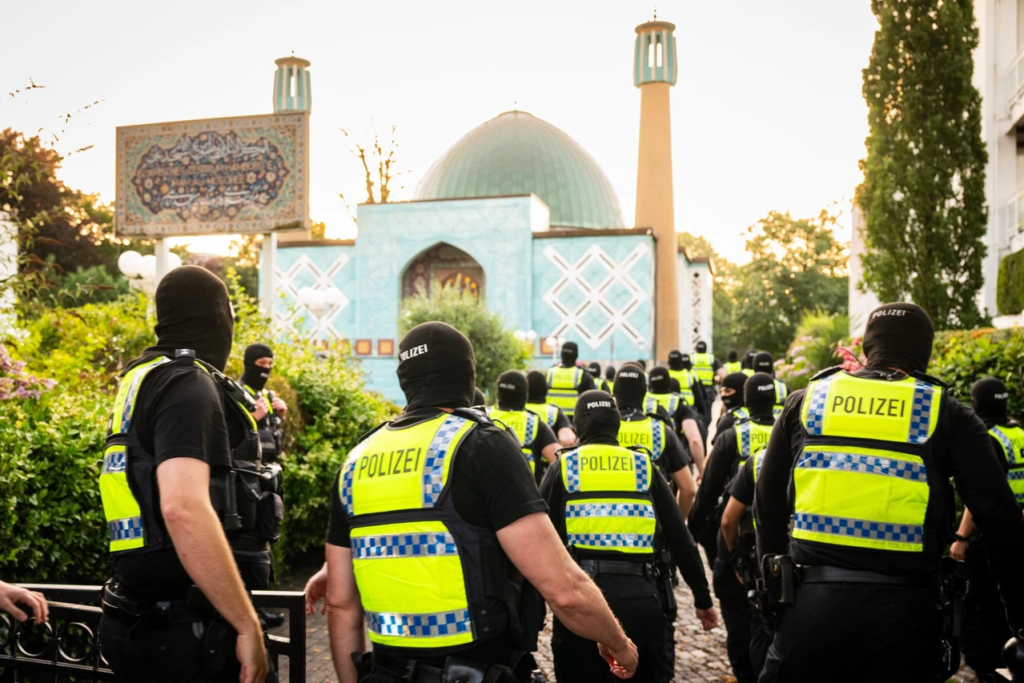Nationwide raids target Iranian-linked Islamic organizations.
Federal Interior Minister Nancy Faeser has imposed a ban on the activities of the Islamic Center Hamburg (IZH) on July 24, 2024. The morning saw nationwide raids on mosques and association premises, followed by Iran summoning the German ambassador in the afternoon. This escalation marks a significant moment in German-Iranian relations and domestic security policy.

The raid on the Blue Mosque
According to a dpa reporter, dozens of officers cordoned off the Shiite house of worship operated by the IZH, which is classified as extremist and Iranian-controlled by the Federal Office for the Protection of the Constitution. The police deployment was substantial, reflecting the seriousness of the operation.
Reasons for the ban
The Federal Ministry of the Interior’s ban order, spanning over 200 pages, alleges that the IZH propagates aggressive antisemitism and massive hostility towards Israel, thereby violating the idea of international understanding. The association is accused of spreading the ideology of totalitarian Islamism as represented by the Iranian regime. Additionally, the IZH is alleged to have supported the terrorist organization Hezbollah.
Iran’s reaction
On Wednesday afternoon, Iran responded to the events by summoning the German ambassador. This diplomatic move signals the potential for escalating tensions between Germany and Iran.
IZH under surveillance for 31 years
The Islamic Center Hamburg has been under observation by the Federal Office for the Protection of the Constitution since 1993. The office states, “The IZH is ideologically, organizationally, and personally an outpost of the Tehran regime.” Along with the center, five other associations considered sub-organizations of the IZH were also banned.
While the IZH presents itself as apolitical externally, its leader, Mohammad Hadi Mofattah, reportedly reports directly to Tehran. When the 58-year-old returned from a trip to Iran a few years ago, police found documents identifying him as a “representative of the Supreme Leader,” Ayatollah Ali Khamenei, indicating that he receives his instructions directly from the Iranian capital.
Nationwide raids and asset seizures
In total, 53 objects across Germany were searched, including mosques and association rooms. Assets and materials were seized with the aim of dismantling Islamist networks and securing evidence. This large-scale operation underscores the German government’s commitment to addressing perceived threats to national security and social cohesion.
The future of the Blue Mosque

The ban on the IZH comes with a unique aspect: the listed property on the Outer Alster apparently now passes into state ownership. According to security circles, the mosque should continue to be available for religious purposes in the future. However, who will take over the leadership of the mosque has not yet been determined. This situation presents a delicate challenge in balancing religious freedom with national security concerns.
Potential repercussions
The Federal Foreign Office now expects retaliatory measures from Tehran, such as a ban on German organizations and institutions. There is also concern, according to NDR, WDR, and SZ, that the death penalty could be carried out against Jamshid Sharmahd, a German-Iranian sentenced in February 2023. Sharmahd, who was active in the Iranian exile opposition, was accused of terrorist acts and cooperation with foreign intelligence services, charges he has always denied.
This ban and the subsequent raids represent a significant escalation in Germany’s approach to organizations suspected of ties to foreign governments and extremist ideologies. It highlights the complex interplay between national security, diplomatic relations, and the rights of religious and cultural associations in a diverse society. The coming weeks and months will likely see further developments in this sensitive area of policy and international relations.






